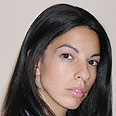
Tali Farkash
No hole in the sheet
While conceding that much of the stories told about haredi society are true, 'the nasty habit of confronting the past by turning all haredim into miserable people in a closet has become a bit pathetic.' Tali Farkash writes to Gerrer hassid woman who became secular
Last Shabbat, the story of Sarah Einfeld broke through to the "free" world. A woman with whom I have a once-sided love-hate relationship.
Sarah, previously a pious Gerrer hassid and currently a pained secular divorcee mother of two, spread her story across the pages of Yedioth Ahronoth to show anyone who still had any shadow of a doubt in their mind just how hard it is to be a woman, and haredi on top of that, and a Gerrer hassid on top of that. With the precision of a plastic surgeon, she deconstructs the enigma called a "modern newly secular person." But even here, the whole is greater than the sum of its parts.
Perhaps it is just a feeling, but those who leave religion never really leave, they escape. To Tel Aviv, to a commune in the Galilee, to a kibbutz in the Negev, to the media. Or, like a beloved childhood friend of mine, they choose to put into action the over-played expression and escape to Honolulu, leaving me sending her signs of life via email.
Out of all of those I have met who have left the religious way of life – and I have met quite a few – not one of them became a "conventional secular person" with a Mazda 3, two kids, and a monstrous LCD in the living room across from the sofa. They are always something a little different with a lot of pain.
Contrary to what the many haredim who read the article will say about Sarah, every word there is true. Truth the hard way. "A two-hour fateful meeting with 'the one' followed by a suffocating lifetime and personal desolation" is the story of many women in haredi society. But in response to these comments, the majority prefers to do the obvious in these cases of "particularly dirty laundry" – bury their heads in the sand. Men in the haredi sector will arm themselves with the approach of "be a righteous woman and keep quiet." Haredi women, in the best case, will adopt the version of "the poor girl fell victim to bad matchmaking" and in the worst case will see her as a traitor. So where is the surprise that people are escaping?
The real story
But the real story of Sarah and others who have left religion is in the delicate spaces between the letters, in the pauses, the sighs between each line. It's there and not there. Because its not really the man by your side, or in this case, the man on top of you (for Gerrers, the man is always on top), a wicked rebbetzin, or social pressure that create the intense drive to get out. It's something entirely different.
Reality reveals that the moment must come in the life of every haredi in which he examines himself and his surroundings. Like every adult, including haredim, he needs to clash with the group in which he lives, to rebel against it – be it outwardly or secretly – and through this to reveal who he really is. At the end of this self-flagellating process that occurs at the age of 12, 22, or 32, something emerges: A pious person, a hermit, or an unbeliever.
Then the lot is cast for each person to enthusiastically adopt the sectarian codes with utmost precision. The line is drawn by some for the sake of rabbis and conscience. Others do it out of status and maintaining a good reputation. Alongside them are the "double agents" who hide the television in the closet when they go get the haredi newspaper from the mailbox in the morning.
And then there are strange birds like myself who need a friend from the "double agent" crowd to scan the article from Yedioth for them because they don't have secular newspapers at home, but do have National Geographic. And there are the "Sarahs" whom you read about over the weekend - the ones who have left behind the good, the bad, and the ugly of the haredi world for the good, the bad, and the ugly of the secular world.
With all my agreement to disagree with those who once were "with me" and now aren't, I have a difficult time with the basic need of the average formerly religious person to turn the entire haredi society into a silent, black-and-white horror movie. This nasty habit of confronting the past by turning all haredim into miserable people in a closet has become a bit pathetic. The same goes for writing a blog called "The Hole in the Sheet," one of the most repulsive and erroneous myths about haredim, all out of a sense of self-righteous outrage.
Contrary to the manner in which many who have left the community tend to describe "the inside" to those on "the outside," there are also many excellent reason for people to be haredi out of choice. Behind the walls and the partitions, there is another kind of life. Life full of love, relationships, true happiness – life with meaning. This is difficult to see when you feel foreign, or a lack of belonging seasoned with terrible anger. Sometimes only after a cooling off period can one look back in and read A. Margalit, the Gerrer poet whom I love, together with Natan Alterman and to feel good about it.
And yet, when I come up against the suffering they experience, bosom friends and acquaintances who have ventured out, I am left with this ridiculous need to comfort and hug all of them, even Sarah.










